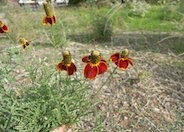
Common name:Mexican Hat
Botanical name:Ratibida columnaris
This unusual perennial forms large dense mounds 2' tall 1' wide. Prefers full sun and well-drained soil. The tall center cone rises above deep maroon petals that are tinged with yellow tips, and the long-lasting flowers literally cover the plant all summer and into the fall. This is a good cut flower.
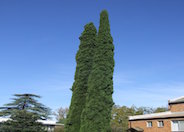
Common name:Italian Cypress
Botanical name:Cupressus sempervirens
This narrow tree will grow to about 25' tall and has small, green, scaled leaves.
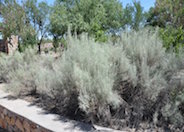
Common name:Sand Sage
Botanical name:Artemisia filifolia
Provides softness and movement in the landscape. Fragrant, threadlike leaves and stems, airy evergreen shrub is covered wiht white hairs giving it a silvery cast. Flowers inconspicuous. Fast to 3' tall and wide. Native to western plans and southwest. Grows in rocky or sandy soils 1-8000'. Full sun and well drained soils. Will tolerate sandy and clay soils.
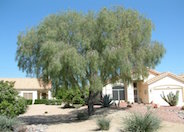
Common name:Willow Acacia
Botanical name:Acacia salicina
Evergreen tree grows quickly to 30' x 15'. Has drooping habit with medium green foliage. Flowers are fragrant creamy puffballs and appear in the spring. Needs deep well drained soil & some water to establish. Full sun. Suitable screen for narrow areas. Native to Australia.
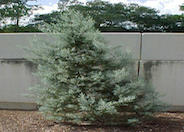
Common name:Arizona Cypress Blue Ice
Botanical name:Cupressus arizonica 'Blue Ice'
Arizona native conifer tree grows at a moderate rate to 50' x 20' wide. Foliage has a distinct silvery blue cast. Accepts full sun. Is drought tolerant and resistant to wind. Needs good drainage.
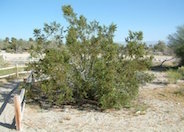
Common name:Creosote Bush
Botanical name:Larrea tridentata
Open, angular evergreen shrub grows to 6'x 6'. Dark green, foliage is fragrant after a rain. One of the most abundant plants in the southwest desert. Extremely drought tolerant. Good informal screen. Native to North American deserts.
| Designer: Sarah Wood | The Beloved Garden 6 |
Photographer: GardenSoft |
Soils and Compost:
Physical weed control, including mulching, or hand removal protects the watershed from harmful chemicals.
Water Saving Tip:
Remember to check your irrigation system at least once a month, especially your valves, sprinkler heads, and drip emitters.
Integrated Pest Management:
Drip and other smart irrigation delivers water directly to roots, allowing no excess water for weeds.
